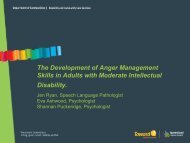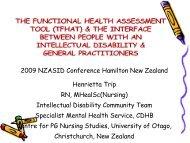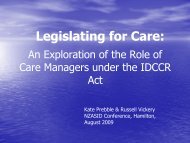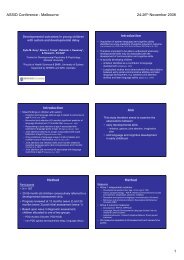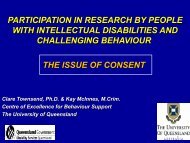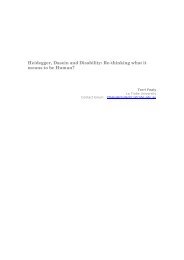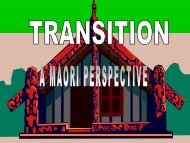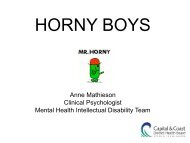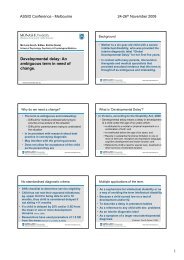Sexuality & Relationship support for people with an intellectual ...
Sexuality & Relationship support for people with an intellectual ...
Sexuality & Relationship support for people with an intellectual ...
You also want an ePaper? Increase the reach of your titles
YUMPU automatically turns print PDFs into web optimized ePapers that Google loves.
9 th Annual DSW ConferenceMelbourne, 18-19 th November 2009<strong>Sexuality</strong> & <strong>Relationship</strong> <strong>support</strong> <strong>for</strong><strong>people</strong> <strong>with</strong> <strong>an</strong> <strong>intellectual</strong> disability:Policy to practiceDr Patsie Frawley, Amie O’Shea –ARCSHSJohn Willis – Golden City SupportServicesMelbourne, Australiawww.latrobe.edu.au/arcshsIntroduction & Background• Expression of sexuality <strong>an</strong>d having relationships is <strong>an</strong>integral part of everyone’s lives• Research tells us that <strong>people</strong> <strong>with</strong> <strong>an</strong> <strong>intellectual</strong> disabilityw<strong>an</strong>t to be able to express their sexuality <strong>an</strong>d haverelationships – <strong>an</strong>d they experience a r<strong>an</strong>ge of barriers indoing this• Disability <strong>support</strong> services have a responsibility to enable<strong>people</strong> to have relationships <strong>an</strong>d express their sexuality –they face a number of challenges in meeting thisobligation• Policy in<strong>for</strong>med by the aspirations <strong>an</strong>d rights of <strong>people</strong> isneeded to guide <strong>support</strong> workers in this area• This part of your work is ‘not negotiable’ – your servicesneed to consider how they c<strong>an</strong> enable you to offer this<strong>support</strong>www.latrobe.edu.au/arcshs1
9 th Annual DSW ConferenceMelbourne, 18-19 th November 2009What we know from the researchWhat <strong>people</strong> <strong>with</strong> <strong>intellectual</strong> disability havesaid about relationships <strong>an</strong>d sexuality• They have sexual lives (though these c<strong>an</strong>be hidden <strong>an</strong>d may there<strong>for</strong>e be unsafe)• Experiences of isolation, loneliness,rejection• Experiences of joy, love <strong>an</strong>d celebration insexuality <strong>an</strong>d relationships (Johnson, Hillier, Harrison &Frawley, 2001)www.latrobe.edu.au/arcshsHow others perceive sexuality <strong>an</strong>d relationships in the livesof <strong>people</strong> <strong>with</strong> <strong>an</strong> <strong>intellectual</strong> disability• Often a sense of risk or d<strong>an</strong>ger <strong>an</strong>d m<strong>an</strong>aging this• Rarely discussed in a positive sense - happiness,pleasure or enjoyment. (Tepper 2000)The place of sexuality <strong>an</strong>d relationships in the broaderdisability field• The focus has been on rights <strong>an</strong>d access to services –sexuality <strong>an</strong>d relationships left lower on the list (Shakespeare,2000)• Families who are integrally involved in pl<strong>an</strong>ning <strong>for</strong> <strong>an</strong>d<strong>with</strong> <strong>people</strong> <strong>with</strong> <strong>an</strong> <strong>intellectual</strong> disability prioritiseaccommodation, respite, day programs <strong>an</strong>d therapy –sexuality <strong>an</strong>d relationships not identified. (Burton-Smith et al2009)www.latrobe.edu.au/arcshs2
9 th Annual DSW ConferenceMelbourne, 18-19 th November 2009Sexual knowledge• Some areas where <strong>people</strong> don’t have goodknowledge: sexually tr<strong>an</strong>smitted infections,sexual health, safer sex practices, legal issues<strong>an</strong>d contraception. (Galea et al 2004)Attitudes of others• M<strong>an</strong>y <strong>people</strong> are uncom<strong>for</strong>table <strong>with</strong> issues todo <strong>with</strong> <strong>intellectual</strong> disability <strong>an</strong>d sexuality. (Szollos &McCabe 1995)• Parenting is the area where <strong>people</strong>’s attitudesare often the least positive (Cuskelly & Bryde 2004; White &Spencer, 2009)• This has <strong>an</strong> impact on <strong>people</strong>’s ability to parentwww.latrobe.edu.au/arcshsViolence <strong>an</strong>d abuse• Sexual violence <strong>an</strong>d abuse is experienced at ahigher rate by <strong>people</strong> <strong>with</strong> <strong>intellectual</strong> disabilityth<strong>an</strong> the general population – research suggests<strong>an</strong>ywhere from 3 to 10 times more likely l (Sobsey &Doe,1991; Sobsey, 1994; 2000) .• Incidence <strong>an</strong>d prevalence figures <strong>for</strong> Australiaare lacking – leading to a lack of awareness <strong>an</strong>daction (WWDA 2004)• Increased vulnerability in two ways: societalattitudes about <strong>intellectual</strong> disability & lifeexperiences of <strong>people</strong> <strong>with</strong> <strong>an</strong> <strong>intellectual</strong>disabilitywww.latrobe.edu.au/arcshs3
9 th Annual DSW ConferenceMelbourne, 18-19 th November 2009H<strong>an</strong>nah’s story - LSSL• What would you say to H<strong>an</strong>nah after hearing herstory?• What does her story tell you about the challengesfaced by <strong>people</strong> <strong>with</strong> <strong>an</strong> <strong>intellectual</strong> disability intrying to determine their sexual lives?• What does her story tell you about the issueswomen <strong>with</strong> <strong>an</strong> <strong>intellectual</strong> disability c<strong>an</strong> face inrelationships <strong>an</strong>d regarding violence <strong>an</strong>d abuse?• How has the service system impacted on her life<strong>an</strong>d what have the consequences been <strong>for</strong> her?• What would you w<strong>an</strong>t to see ch<strong>an</strong>ged <strong>for</strong> H<strong>an</strong>nah?And how could you bring about this ch<strong>an</strong>ge?www.latrobe.edu.au/arcshsHow c<strong>an</strong> disability org<strong>an</strong>isationsrespond?• The policy development journey of GCSS• Recognising the needs of <strong>people</strong> <strong>with</strong> adisability – <strong>an</strong>d the responsibility of serviceprovision• Quality of life domains• Recognition of whole of life (personcentred pl<strong>an</strong>ning)• Individual circumst<strong>an</strong>ceswww.latrobe.edu.au/arcshs4
9 th Annual DSW ConferenceMelbourne, 18-19 th November 2009Responsibility <strong>an</strong>d duty of careto staff• Uncertainty <strong>an</strong>d lack of clarity <strong>for</strong> staff• Complex issues that staff are asked towork through <strong>an</strong>d a lack of guidelines <strong>for</strong>doing this in the area of sexuality• Protecting staff from legal <strong>an</strong>d ethicalwrongdoingwww.latrobe.edu.au/arcshsChallenges• Pressure of other priorities – how do youkeep it on the agenda?• Introducing a controversial subject –placing it in context• Sharing in<strong>for</strong>mation– <strong>with</strong> <strong>people</strong> being <strong>support</strong>ed (in a <strong>for</strong>matthat c<strong>an</strong> be understood)- <strong>with</strong> families - <strong>with</strong> all staffwww.latrobe.edu.au/arcshs5
9 th Annual DSW ConferenceMelbourne, 18-19 th November 2009What is required?• Commitment to the length of the process– import<strong>an</strong>ce of discussion <strong>an</strong>d talking• Commitment of whole of agency –m<strong>an</strong>agement, supervisors <strong>an</strong>d staff• Commitment to following through toimplementation (staff, individuals, families)www.latrobe.edu.au/arcshsWhat does this me<strong>an</strong> <strong>for</strong> DSW’s• DDA – make adjustments <strong>an</strong>d accommodations toensure <strong>people</strong> <strong>with</strong> a disability are not disadv<strong>an</strong>taged ordiscriminated against because of their disability• Provide Active Support to ensure a person <strong>with</strong> adisability has the best opportunities to learn, participatein daily life <strong>an</strong>d be self determining• Bal<strong>an</strong>ce rights <strong>an</strong>d risks using a Duty of Care framework• Assume competence – only provide as much <strong>support</strong> asis needed to ensure the best ch<strong>an</strong>ce at in<strong>for</strong>med <strong>an</strong>dindependent decision making• Use policy to guide your workwww.latrobe.edu.au/arcshs6
9 th Annual DSW ConferenceMelbourne, 18-19 th November 2009Supporting relationships <strong>an</strong>d sexualitySupporting <strong>people</strong>in intimaterelationshipsSupport to make<strong>an</strong>d keep friendsSupporting <strong>people</strong>to express theirsexualitySupport in broadersocial relationshipsSupporting <strong>people</strong>to express theirindividualitySupporting <strong>people</strong>to develop theirown identitywww.latrobe.edu.au/arcshsReferencesBurton-Smith, R., McVilly, K. R., Yazbeck, M., Parmenter, T. R., & Tsutsui, T. (2009). Service <strong>an</strong>d <strong>support</strong>needs of Australi<strong>an</strong> carers <strong>support</strong>ing a family member <strong>with</strong> disability at home. Journal of Intellectual &Developmental Disability, 34 (3), 239-247.Cuskelly, M., & Bryde, R. (2004). Attitudes towards the sexuality of adults <strong>with</strong> <strong>an</strong> <strong>intellectual</strong> disability:parents, <strong>support</strong> staff <strong>an</strong>d a community sample. Journal of Intellectual <strong>an</strong>d Developmental Disability, 29(3), 255-264.Galea, J., Butler, J., Iacono, T., & Leighton, D. (2004). The assessment of sexual knowledge in <strong>people</strong> <strong>with</strong><strong>intellectual</strong> t l disability. Journal of Intellectual t l <strong>an</strong>d Developmental l Disability, 29 (4), 350-365. 365Johnson, K., Hillier, L., Harrison, L., & Frawley, P. (2000). Living Safer Sexual Lives. Melbourne: Australi<strong>an</strong>Research Centre in Sex, Health <strong>an</strong>d Society.Salthouse, S., & Frohmader, C. (2004). 'Double the odds' - Domestic violence <strong>an</strong>d women <strong>with</strong> disabilities.Paper presented at the 'Home truths' conference, Sheraton Towers, Southgate, Melbourne 15-17September 2004.Sobsey, D <strong>an</strong>d Doe, T (1991) 'Patterns of sexual abuse <strong>an</strong>d assault' <strong>Sexuality</strong> <strong>an</strong>ddisability 9 (3) 243-59Sobsey, D (1994) Violence <strong>an</strong>d abuse in the lives of <strong>people</strong> <strong>with</strong> disabilities: The end of silent accept<strong>an</strong>ce?Baltimore: PH BrookesSobsey, D (2000) Faces of violence against women <strong>with</strong> developmental disabilities ImpactShakespeare, T. (2000). Disabled <strong>Sexuality</strong>: Towards Rights <strong>an</strong>d Recognition. Paper presented at theDisability, <strong>Sexuality</strong> & Culture: Societal <strong>an</strong>d Experiential Perspectives on Multiple Identities. fromhttp://www.bentvoices.org/culturecrash/shakespeare.htm.org/culturecrash/shakespeare htmSzollos, A. A., & McCabe, M. P. (1995). The sexuality of <strong>people</strong> <strong>with</strong> mild <strong>intellectual</strong> disability: perceptionsof clients <strong>an</strong>d caregivers. Australi<strong>an</strong> <strong>an</strong>d New Zeal<strong>an</strong>d Journal of Developmental Disabilities, 20 (3),205-222.Tepper, M. S. (2000). <strong>Sexuality</strong> <strong>an</strong>d Disability: The Missing Discourse of Pleasure. <strong>Sexuality</strong> <strong>an</strong>d Disability,18 (4), 283-290.White, A., Spencer, M & Mayes, R., (2009) Being a mum: the first five years. 44 th Conference presentationASSID conferencewww.latrobe.edu.au/arcshs7



